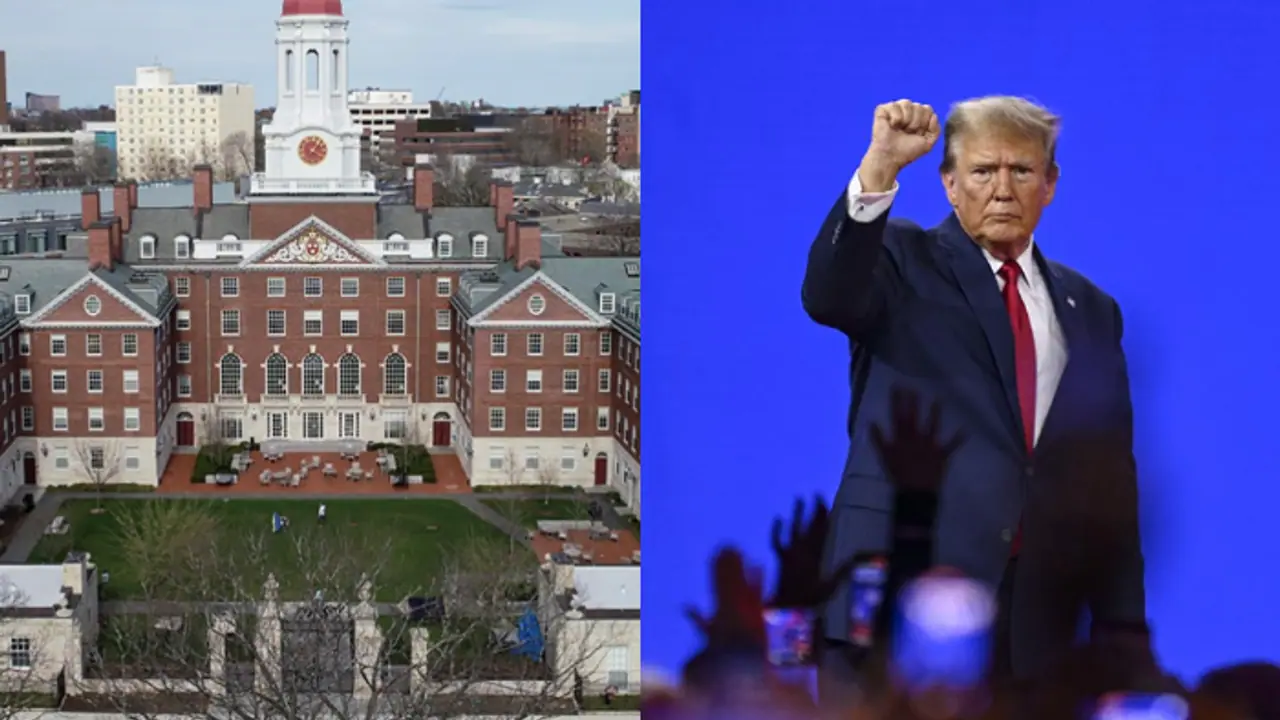In 2025, during his second term, Donald Trump intensifies his feud with Harvard University, using the full power of the federal government to impose a range of punitive measures, including halting funding and jeopardizing international student visas.
Harvard — the university where Mark Zuckerberg created the early version of Facebook to rate his peers, where eight U.S. presidents honed their leadership skills, and where a recent president resigned over a citation scandal — stands as a symbol of elite ambition, academic confidence, and prestigious tradition, cloaked in its iconic crimson. Naturally, it's a prime target for Donald Trump.

In 2025, during his second term, Trump isn’t merely feuding with Harvard — he’s leveraging the full force of the federal government to clamp down on it. With funding halted, international student visas in jeopardy, and escalating political pressure, this move goes beyond conflict. It marks a calculated campaign that is redefining the dynamics between federal power and higher education institutions.
Let us examine this issue:
1. Trump freezes $ 2.3 billion
The Trump administration has frozen more than $2.3 billion in research grants and federal contracts directed to Harvard University.
Why? The official line from the Department of Education: Harvard allegedly failed to ensure the safety and fair treatment of Jewish students amid growing tensions and discrimination tied to pro-Palestinian protests on campus.
2. The Fallout from October 7 Triggered a Major Crisis
The controversy ignited when student groups at Harvard issued a statement that the October 7 Hamas attacks, attributing responsibility for the violence in Gaza to Israel. This declaration provoked significant backlash, particularly from major donors. Hedge fund billionaire Bill Ackman spearheaded criticism, condemning what he described as Harvard’s failure of moral leadership. The university’s initial, measured response drew criticism from across the political spectrum, ultimately portraying Harvard as distant, indecisive, and disconnected from public sentiment.
3. Plagiarism scandal
In December 2024, Harvard President Claudine Gay resigned under a cloud of plagiarism allegations — and not just one or two. The scandal played right into every stereotype about entitled, unaccountable academic elites.
It was a credibility collapse at the top, leaving the university scrambling to defend its reputation.
So by the time the Trump administration started flexing federal power in 2025, Harvard was already limping — morally, publicly, and politically.
4. Homeland Security Joins
In a jaw-dropping escalation, the Department of Homeland Security stepped in, launching a review of Harvard’s SEVP certification (the license that lets them admit international students).
This is usually a rubber-stamp process. Now? It’s a political weapon.
For a school that hosts over 6,000 international students, this isn’t symbolic. It’s existential.
This isn’t some speculative “what if” — it’s a live, ongoing review, and it’s deadly serious.
5. The Department of Education Launched a Civil Rights Investigation
At the same time, the Department of Education kicked off a Title VI investigation, accusing Harvard of allowing a hostile environment for Jewish students. Other universities are being looked at too — but Harvard’s probe is by far the most aggressive, and it now has federal funding on the line.
6. Formal Legal letter from Harvard
Harvard didn’t reply with online snark or a 4,000-word treatise on John Locke. Instead, it sent a formal legal letter. Signed by interim President Alan Garber, the letter stated that Harvard would not comply with federal directives it deemed a violation of constitutional protections, including free speech rights.
7. No memes from Trump
Trump isn’t resorting to tweeting memes or labeling Harvard as “woke” on Truth Social. He doesn’t have to. His administration is making its point through concrete actions: leveraging funding and visa authority to push for changes, using bureaucratic pressure to enforce ideological alignment rather than relying on loud rhetoric.
8. Threat to students
While Harvard has not yet lost its ability to enroll international students, the looming threat is serious enough to prompt legal organizations like the ACLU to prepare for a battle, arguing that it is an unconstitutional use of immigration policy to punish political speech and expression. This has already had a noticeable impact on students. International scholars have reported increased scrutiny of their social media activity and sudden discrepancies in their SEVIS records. The underlying message is clear: be cautious with your words, or risk remaining silent altogether.
9. Other universities are watching closely
This issue extends beyond just Harvard. Universities like Columbia, Penn, MIT, and Stanford have faced similar investigations or backlash from donors due to related protests. However, Harvard, as the most prestigious institution, is the focal point—being used as an example. If the government succeeds in forcing Harvard to change its policies through funding cuts and immigration restrictions, it will send a message that no other campus can afford to challenge these actions.
10. Future of campus politics
This conflict goes beyond just issues of antisemitism or DEI; it raises the fundamental question of whether a university, no matter how wealthy or influential, can stand up to a federal government that demands ideological conformity for its continued operation. While the courts may ultimately decide whether Trump's use of funding and immigration powers breaches the Constitution, the political precedent has already been established.
Harvard is battling to preserve its independence, while Trump seeks to reshape elite academia to fit his agenda. This struggle goes beyond individual reputations; it’s a fight over defining the boundaries of speech, power, and authority in American education. Regardless of the outcome, the lesson for 2025 is already clear: Compliance will be rewarded, and dissent will be scrutinized.

